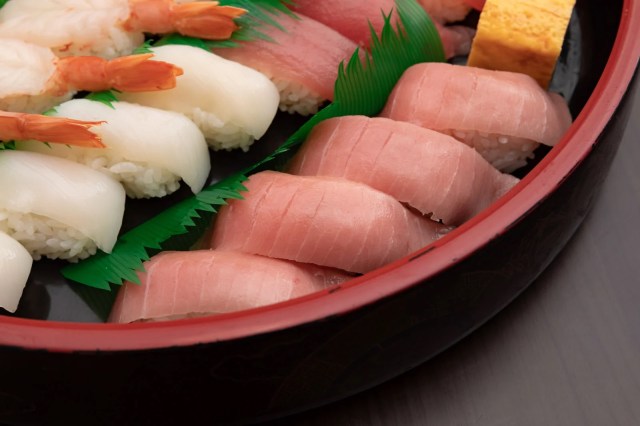
Since even before the phenomenally popular documentary Jiro Dreams of Sushi put the idea up on the big screen, there’s been a belief in Japan that it takes a long, long time to become a skilled sushi chef. As a matter of fact, properly preparing slices of raw fish atop morsels of vinegared rice has traditionally been considered such a complex skill that when conveyor belt sushi restaurants and other low-price opportunities to enjoy the dish first appeared in Japan, they were scoffed at by gourmands as “not real sushi.”
But are attitudes changing? Kaitenzushi restaurants, as revolving sushi joints are called in Japanese, are more popular than ever. What’s more, some people are no longer convinced that it’s as difficult to make sushi as the old masters say, including one of Japan’s most famous entrepreneurs, who’s been calling the whole idea that preparing good sushi requires several years of training a scam.
There was a time when Takafumi Horie was the golden boy of the Japanese business world. As the founder of Internet portal Livedoor, by the time Horie reached his mid-30s he’d become a household name thanks to his dynamic, aggressive investment strategies and casual yet flamboyant way of dressing and conducting himself.
However, Horie didn’t just ruffle the feathers of Japan’s old guard. He also ran afoul of the authorities, spending almost two years in prison for securities fraud. Having served his time, he still makes frequent appearances in the Japanese media, and recently told his 1.4 million Twitter followers, in no uncertain terms, how he feels about the traditional timetable for becoming a full-fledged sushi chef.
In reaction to a website championing the orthodox way of doing things, Horie tweeted:
バカなブログだな。今時、イケてる寿司屋はそんな悠長な修行しねーよ。センスの方が大事
— 堀江貴文(Takafumi Horie、ホリエモン) (@takapon_jp) October 29, 2015
寿司職人の“飯炊き3年握り8年”は時代遅れ? ホリエモンの斬新な考えとは 求人@飲食店.COM https://t.co/ST0fzYsHYU
“What a dumb blog. Good sushi restaurants these days don’t take such a leisurely approach to their training…Isn’t saying ‘It takes three years to learn how to prepare the rice, and eight years to learn how to press it into nigiri sushi, behind the times?”
Still, an idea doesn’t become entrenched in society without a lot of people buying into it. The tweet set off a debate on Twitter, with the always outspoken Horie firing back rebuttals to his challengers.
?そんなん当たり前やん。そんな事覚えんのに何年もかかる奴が馬鹿って事だよボケ
— 堀江貴文(Takafumi Horie、ホリエモン) (@takapon_jp) October 29, 2015
RT @michiyotajma:
シャリ握るって、形になればいいって事では無い。飯炊くのも、米の水分含有量が季節で違うからね。経営者としてはありだけど、何でも知ってる訳じゃ無い事、自覚して欲しい。
@michiyotajima: “It’s not enough just to press the rice into shape. The correct way to cook the rice, and how much water to use, varies by the season. That’s something restaurant operators understand, but I want you to be aware of the fact that you don’t know everything.”
Horie: “That’s obvious. But what I’m telling you, you ditz, is that if it takes someone years and years to learn how to do that, he’s an idiot.”
は?寿司アカデミーとか知らないの?最近は美味い店でも独学も多い。センスの良い人は習わなくてもできるのよ
— 堀江貴文(Takafumi Horie、ホリエモン) (@takapon_jp) October 29, 2015
RT @michiyotajma: @takapon_jp
いきなり、
寿司屋に入って
寿司握られもらえませんよ。
そこから入るなら
@michiyotajima: “You can’t have people who just began working at a sushi restaurant making the nigiri sushi. They have to start somewhere.”
Horie: “What? Haven’t you heard of sushi academies [specialized culinary schools that train sushi chefs]. These days, there are even a lot of good sushi restaurants run by people who taught themselves. If people have an aptitude they can make good sushi without having to study it.”
With the discussion underway, there were also those who agreed with Horie that something is fishy about the situation.
そそ。それをいい事に安月給でこき使われてんのよ。いい加減自覚しようや
— 堀江貴文(Takafumi Horie、ホリエモン) (@takapon_jp) October 29, 2015
RT @only_values: @takapon_jp これって苦労して手に入れたものの方が価値があるって思ってしまう認知バイアスですよね。
@onlu_values: “This plays into the bias people have that things that if something was hard to come by, it should be worth a lot.”
Horie: “Right, right. They use that as an excuse to pay the trainees low monthly salaries and work them like crazy. That’s something we should wise up to.”
Horie also worries about this sort of thinking becoming more common among diners in Japan.
どうやっても時間をかけないと寿司の握りや材料選びのテクニックなどは習得できないと考える、命と等しい時間を無駄にかけないとダメだと思う原理主義者が蔓延っているようです
— 堀江貴文(Takafumi Horie、ホリエモン) (@takapon_jp) November 3, 2015
ホリエモン「大事なものが欠けているのはお前らの脳だと思うよ」... https://t.co/J8WtlBvo7G
“It seems like there are an increasing number of sushi fundamentalists who believe that unless you spend a lot of time, really your whole life, learning the techniques for forming the sushi and choosing the ingredients, then the final product won’t be any good.”
Whether this is a case of the former fraudster spotting a scam, or another case of Horie being willing to cut corners en route to his desired outcome, is something that diners will have to judge for themselves.

 Is it gross to eat sushi that the chef pressed with his bare hands?【Survey】
Is it gross to eat sushi that the chef pressed with his bare hands?【Survey】 Everything you need to know about dining at a sushi restaurant—in handy infographics!【Pics】
Everything you need to know about dining at a sushi restaurant—in handy infographics!【Pics】 Master sushi chef effortlessly slices and dices vegetables while blindfolded【Video】
Master sushi chef effortlessly slices and dices vegetables while blindfolded【Video】 Learn how to make sushi with a professional Japanese sushi chef in Tokyo
Learn how to make sushi with a professional Japanese sushi chef in Tokyo Mr. Sato tries out Kappa Sushi’s salmon salad mountain, a fun dish available for only one week
Mr. Sato tries out Kappa Sushi’s salmon salad mountain, a fun dish available for only one week McDonald’s new Happy Meals offer up cute and practical Sanrio lifestyle goods
McDonald’s new Happy Meals offer up cute and practical Sanrio lifestyle goods All-you-can-drink Starbucks and amazing views part of Tokyo’s new 170 meter-high sky lounge
All-you-can-drink Starbucks and amazing views part of Tokyo’s new 170 meter-high sky lounge Studio Ghibli releases new action figures featuring Nausicaä of the Valley of the Wind characters
Studio Ghibli releases new action figures featuring Nausicaä of the Valley of the Wind characters Studio Ghibli glasses cases let anime characters keep an eye on your spectacles
Studio Ghibli glasses cases let anime characters keep an eye on your spectacles More foreign tourists than ever before in history visited Japan last month
More foreign tourists than ever before in history visited Japan last month Super Nintendo World expansion gets delayed for several months at Universal Studios Japan
Super Nintendo World expansion gets delayed for several months at Universal Studios Japan The oldest tunnel in Japan is believed to be haunted, and strange things happen when we go there
The oldest tunnel in Japan is believed to be haunted, and strange things happen when we go there Japanese retailer releases three cute & comfy high school “uniforms” to wear around the house
Japanese retailer releases three cute & comfy high school “uniforms” to wear around the house A visit to the oldest Yoshinoya chain in Japan for one last beef bowl before it closes for good
A visit to the oldest Yoshinoya chain in Japan for one last beef bowl before it closes for good Daiso’s 100-yen ramen egg makers even better in smaller sizes
Daiso’s 100-yen ramen egg makers even better in smaller sizes Disney princesses get official manga makeovers for Manga Princess Cafe opening in Tokyo
Disney princesses get official manga makeovers for Manga Princess Cafe opening in Tokyo Starbucks reopens at Shibuya Scramble Crossing with new look and design concept
Starbucks reopens at Shibuya Scramble Crossing with new look and design concept Beautiful new Final Fantasy T-shirt collection on the way from Uniqlo【Photos】
Beautiful new Final Fantasy T-shirt collection on the way from Uniqlo【Photos】 Is the new Shinkansen Train Desk ticket worth it?
Is the new Shinkansen Train Desk ticket worth it? Foreign English teachers in Japan pick their favorite Japanese-language phrases【Survey】
Foreign English teachers in Japan pick their favorite Japanese-language phrases【Survey】 Beautiful Sailor Moon manhole cover coasters being given out for free by Tokyo tourist center
Beautiful Sailor Moon manhole cover coasters being given out for free by Tokyo tourist center Studio Ghibli releases Kiki’s Delivery Service chocolate cake pouches in Japan
Studio Ghibli releases Kiki’s Delivery Service chocolate cake pouches in Japan Japan’s bone-breaking and record-breaking roller coaster is permanently shutting down
Japan’s bone-breaking and record-breaking roller coaster is permanently shutting down New definition of “Japanese whiskey” goes into effect to prevent fakes from fooling overseas buyers
New definition of “Japanese whiskey” goes into effect to prevent fakes from fooling overseas buyers Our Japanese reporter visits Costco in the U.S., finds super American and very Japanese things
Our Japanese reporter visits Costco in the U.S., finds super American and very Japanese things Studio Ghibli unveils Mother’s Day gift set that captures the love in My Neighbour Totoro
Studio Ghibli unveils Mother’s Day gift set that captures the love in My Neighbour Totoro Domino’s Japan now sells…pizza ears?
Domino’s Japan now sells…pizza ears? New Japanese KitKat flavour stars Sanrio characters, including Hello Kitty
New Japanese KitKat flavour stars Sanrio characters, including Hello Kitty One of Tokyo’s most famous meeting-spot landmarks is closing for good
One of Tokyo’s most famous meeting-spot landmarks is closing for good Kyoto creates new for-tourist buses to address overtourism with higher prices, faster rides
Kyoto creates new for-tourist buses to address overtourism with higher prices, faster rides Sales of Japan’s most convenient train ticket/shopping payment cards suspended indefinitely
Sales of Japan’s most convenient train ticket/shopping payment cards suspended indefinitely Sold-out Studio Ghibli desktop humidifiers are back so Totoro can help you through the dry season
Sold-out Studio Ghibli desktop humidifiers are back so Totoro can help you through the dry season Japanese government to make first change to romanization spelling rules since the 1950s
Japanese government to make first change to romanization spelling rules since the 1950s Ghibli founders Toshio Suzuki and Hayao Miyazaki contribute to Japanese whisky Totoro label design
Ghibli founders Toshio Suzuki and Hayao Miyazaki contribute to Japanese whisky Totoro label design Doraemon found buried at sea as scene from 1993 anime becomes real life【Photos】
Doraemon found buried at sea as scene from 1993 anime becomes real life【Photos】 Tokyo’s most famous Starbucks is closed
Tokyo’s most famous Starbucks is closed One Piece characters’ nationalities revealed, but fans have mixed opinions
One Piece characters’ nationalities revealed, but fans have mixed opinions We asked a Uniqlo employee what four things we should buy and their suggestions didn’t disappoint
We asked a Uniqlo employee what four things we should buy and their suggestions didn’t disappoint Princesses, fruits, and blacksmiths: Study reveals the 30 most unusual family names in Japan
Princesses, fruits, and blacksmiths: Study reveals the 30 most unusual family names in Japan Our reporter dishes on the differences between sushi from Ginza Kyubey and Sushiro【Taste test】
Our reporter dishes on the differences between sushi from Ginza Kyubey and Sushiro【Taste test】 Randomly running into a great sushi lunch like this is one of the best things about eating in Tokyo
Randomly running into a great sushi lunch like this is one of the best things about eating in Tokyo 21 photos of Sukiyabashi Jiro sushi, probably the best in all the world
21 photos of Sukiyabashi Jiro sushi, probably the best in all the world We try a rotating sushi restaurant in New Delhi, are surprised to find no rotating sushi
We try a rotating sushi restaurant in New Delhi, are surprised to find no rotating sushi Who’s ready to make poop cakes with this Japanese cooking gadget?【Photos】
Who’s ready to make poop cakes with this Japanese cooking gadget?【Photos】 Here’s the reason why your expensive ikura sushi often comes with some cheap cucumber slices
Here’s the reason why your expensive ikura sushi often comes with some cheap cucumber slices Ibaraki Prefecture marketing chief regarding their capital city: “Mito sucks! Die!”
Ibaraki Prefecture marketing chief regarding their capital city: “Mito sucks! Die!” Here’s what a 10,000-yen Sushi Cake from Japan looks like
Here’s what a 10,000-yen Sushi Cake from Japan looks like What your favorite sushi says about your income
What your favorite sushi says about your income Nadeshico Sushi restaurant challenges gender roles with all-female staff clad in kimono
Nadeshico Sushi restaurant challenges gender roles with all-female staff clad in kimono Japanese restaurant sears sushi with a soldering iron【Video】
Japanese restaurant sears sushi with a soldering iron【Video】 Conveyor belt sushi chain taking the bold, eco-friendly step of getting rid of all its conveyors
Conveyor belt sushi chain taking the bold, eco-friendly step of getting rid of all its conveyors This sushi restaurant’s take-home temakizushi set is insanely satisfying for a great price
This sushi restaurant’s take-home temakizushi set is insanely satisfying for a great price Sushi tacos now on sale in Japan — Can this cross-cultural cuisine please our biggest taco fan?
Sushi tacos now on sale in Japan — Can this cross-cultural cuisine please our biggest taco fan? Less than half of Japanese people OK with bare hand-pressed rice balls, survey says, but why?
Less than half of Japanese people OK with bare hand-pressed rice balls, survey says, but why? Our Japanese-language writers taste and compare sushi from around the world
Our Japanese-language writers taste and compare sushi from around the world
Leave a Reply